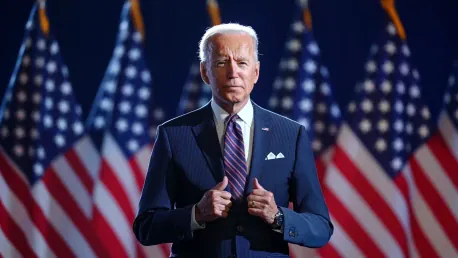President Joe Biden is on the brink of making a pivotal decision that could prevent Nippon Steel’s proposed $14.9 billion acquisition of U.S. Steel, a move with sweeping implications for the nation’s security, economic policies, and political strategy. The industrial Midwest, in particular, becomes a crucial battleground as Vice President Kamala Harris and former President Donald Trump vie for the support of labor unions, adding another layer of complexity to an already intricate issue. The decision weighs heavily on national interests and could influence the electoral landscape significantly.
Nippon Steel remains committed to its bid, despite facing substantial political and market challenges. The pending decision has attracted significant interest partly due to its potential national security implications. The Committee on Foreign Investment in the United States (CFIUS) has yet to deliver its final recommendation, an essential step before President Biden can officially block the transaction. Sources within the industry suggest that preliminary assessments by CFIUS have revealed serious concerns that may be too significant to address adequately. Nevertheless, Nippon Steel maintains its position as a trusted ally of the United States, emphasizing Japan’s robust military ties with the U.S. to argue that the acquisition poses no real threat to security.
National Security Concerns
The debate centers on whether this significant corporate transaction threatens U.S. national security. Industry insiders hint that the Committee on Foreign Investment in the United States (CFIUS) might lean toward identifying serious, unmitigable concerns. Yet, experts are divided. For many analysts, it seems implausible that a Japanese company, particularly one from a country that is a steadfast U.S. ally bound by security treaties, could pose a significant threat. The Pentagon’s steel demands account for just a fraction of overall domestic production and U.S. Steel does not engage directly in manufacturing materials for military purposes.
Nippon Steel argues that its existing operations within the U.S., which already employ thousands of American workers, have posed no previous security threats. This adds another layer to the complexity of the situation, questioning the real national security risks involved. In the midst of these discussions, analyses by various stakeholders are scrutinizing the matter from multiple angles, trying to balance geopolitical considerations with industrial and economic policies. The intertwined nature of these elements makes the decision both profoundly significant and exceedingly complicated for any administration to handle.
Political Ramifications for Biden
The timing of President Biden’s impending decision couldn’t be more critical, given the heavily charged political atmosphere. Both Kamala Harris and Donald Trump have publicly opposed the acquisition, an unusual instance of bipartisan agreement reflecting the high stakes involved. The upcoming election amplifies these stakes, especially as labor union support in key states like Pennsylvania and Indiana could be pivotal for both sides. This has turned the deal into a political firestorm, making it an essential issue for the administration to navigate carefully.
President Biden’s cautious approach is a calculated effort to align his economic policies with overarching national security imperatives. Advisors within the White House, including National Economic Council Director Lael Brainard, have stressed the need for a rigorous review of Nippon Steel’s proposal. This strategy aims to balance protecting economic interests and leveraging tax incentives to spur domestic production. It’s about finding a middle ground that ensures the nation’s industrial base is fortified while keeping the economic benefits within American borders. The challenge is to make these decisions without alienating key voter demographics or upsetting the balance of geopolitical alignments.
Market Impact and Corporate Reactions
The market’s reaction to the potential blockage of the Nippon Steel acquisition was both immediate and severe. U.S. Steel’s stock price plummeted by a staggering 25% within just 30 minutes of trading, following the initial report. By the end of the trading day, the stock had settled at a 17.5% loss. CEO David Burritt of U.S. Steel was quick to underscore the damaging repercussions of the deal’s possible collapse, highlighting the risks to thousands of union jobs and hinting at the likelihood of relocating the company’s headquarters from Pittsburgh. This potential outcome fueled additional concerns among stakeholders and market analysts.
Nippon Steel remains unwavering in its commitment to the acquisition despite these substantial setbacks. The Japanese company has increased its initial investment by $1.3 billion, adding to a prior $1.4 billion pledge aimed at modernizing U.S. Steel’s facilities in Pennsylvania and Indiana. Nippon Steel repeatedly argues that the transaction poses no national security threat, citing Japan’s longstanding alliance with the United States. The company is prepared to explore every lawful avenue to ensure the deal’s completion, demonstrating a resolve that adds another layer of complexity to an already intricate situation. This steadfastness highlights the broader strategic interests at play, further entwining corporate ambitions with national policy considerations.
Union and Legislative Responses
The United Steelworkers union has been vocal in its opposition to Nippon Steel’s acquisition bid, instead endorsing a competing proposal from Cleveland Cliffs, an American steel company. Union president David McCall has dismissed Nippon Steel’s promises regarding worker benefits and investment as non-binding and superficial. This stance has found significant support among lawmakers from steel-producing states like Pennsylvania and Ohio, who have echoed the union’s concerns. Such resistance illustrates the tensions between national economic strategies and regional industrial interests, revealing deeper layers of political and economic conflict.
Lawmakers’ opposition to the deal underscores the broader implications of the acquisition, showcasing the intersection of local and national politics. This dynamic plays into the broader electoral narrative as the nation approaches the next cycle of elections. The charged atmosphere around this deal highlights the intricate web of interests that any decision by President Biden would have to consider. It’s not merely a matter of economic transactions but involves evaluating the far-reaching impacts on labor, regional economies, and national strategy, making it a highly sensitive and complex issue.
Historical Context and Future Implications
President Joe Biden is nearing a critical decision that could prevent Nippon Steel’s planned $14.9 billion acquisition of U.S. Steel, a move that holds significant implications for national security, economic policies, and political strategy. The industrial Midwest becomes especially pivotal as Vice President Kamala Harris and former President Donald Trump compete for labor union support, adding to the complexity of the situation. This decision weighs heavily on national interests and has the potential to influence the electoral landscape considerably.
Despite political and market obstacles, Nippon Steel remains steadfast in its bid. The pending decision has drawn heightened interest due to its national security ramifications. The Committee on Foreign Investment in the United States (CFIUS) has yet to make its final recommendation, a necessary step before President Biden can officially block the deal. According to industry sources, preliminary CFIUS assessments have raised serious concerns that might be challenging to resolve. Still, Nippon Steel argues that its acquisition poses no real security threat, emphasizing Japan’s strong military ties with the U.S. to support its stance.









